Charles E W Bean, Diaries, AWM38 3DRL 606/258/1 - 1914 - 1927 - Part 2
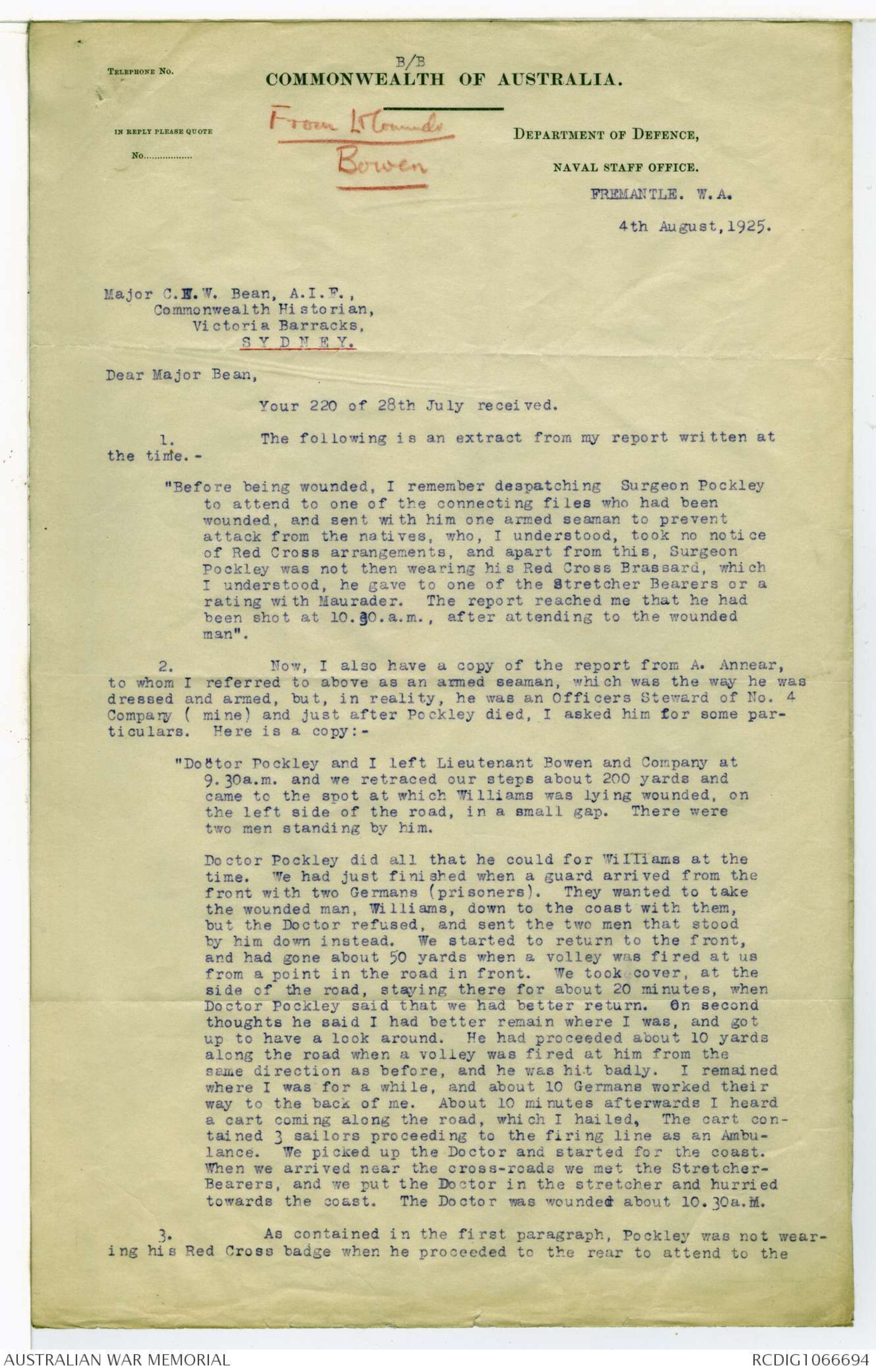
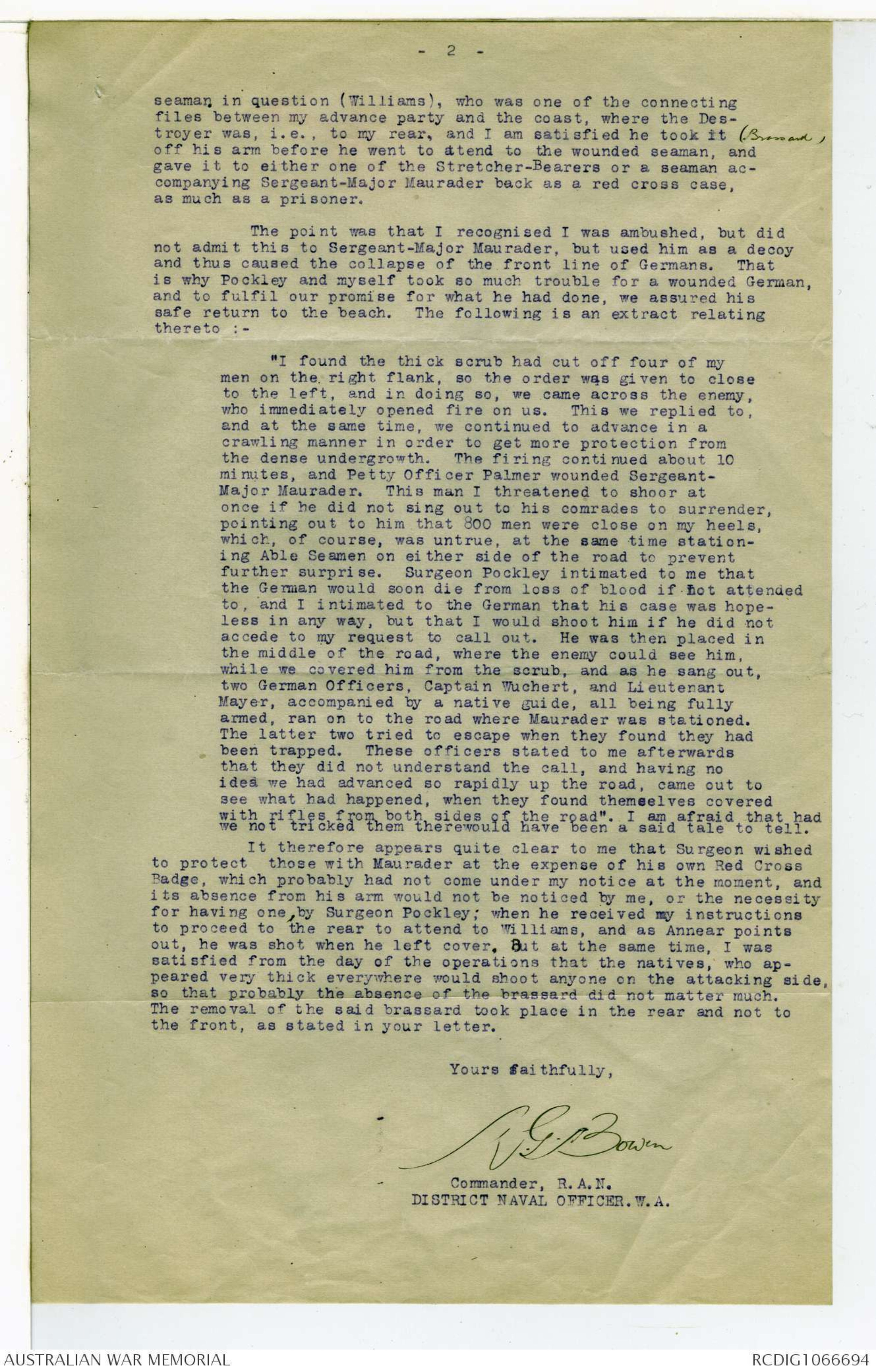
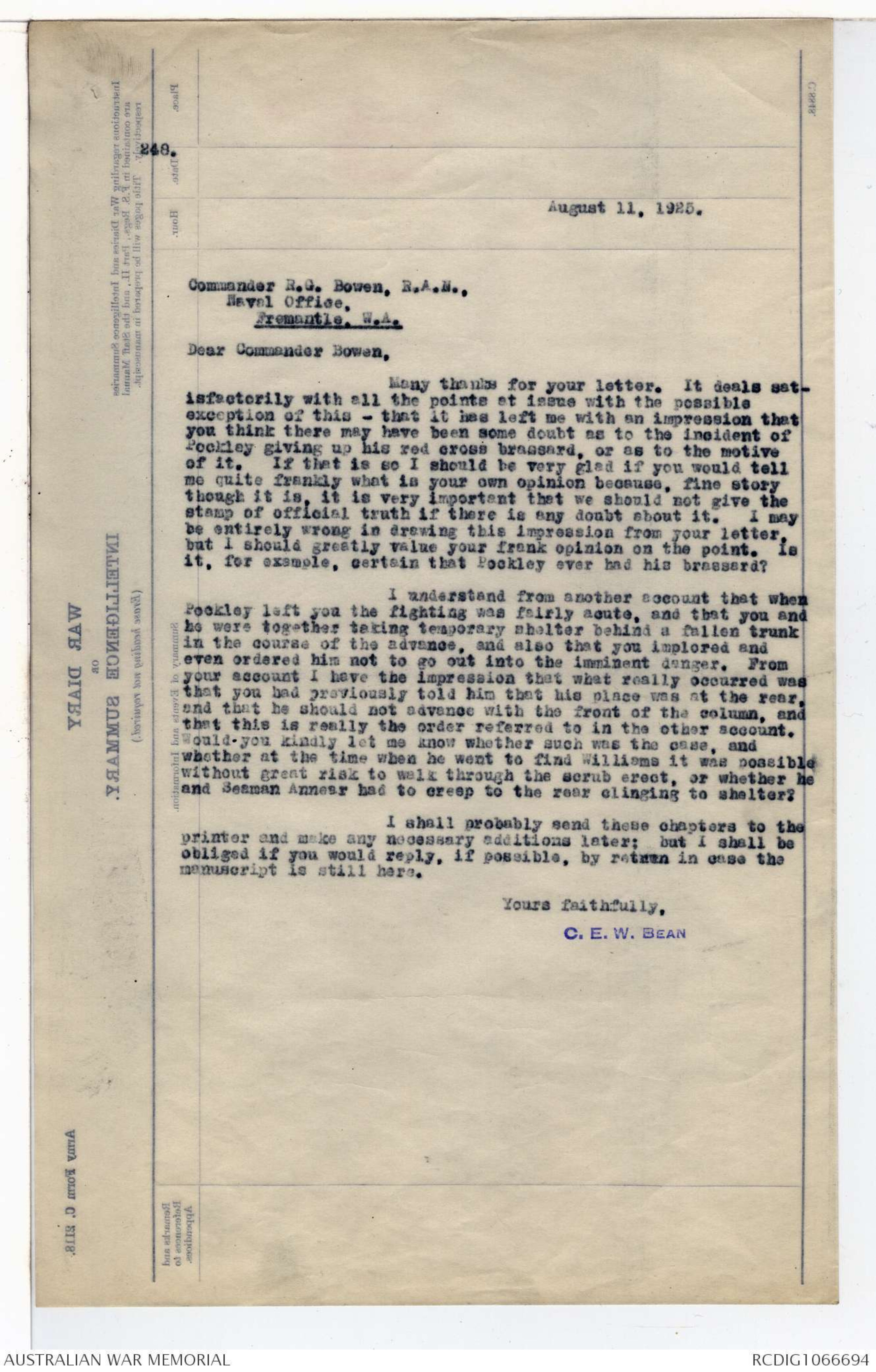
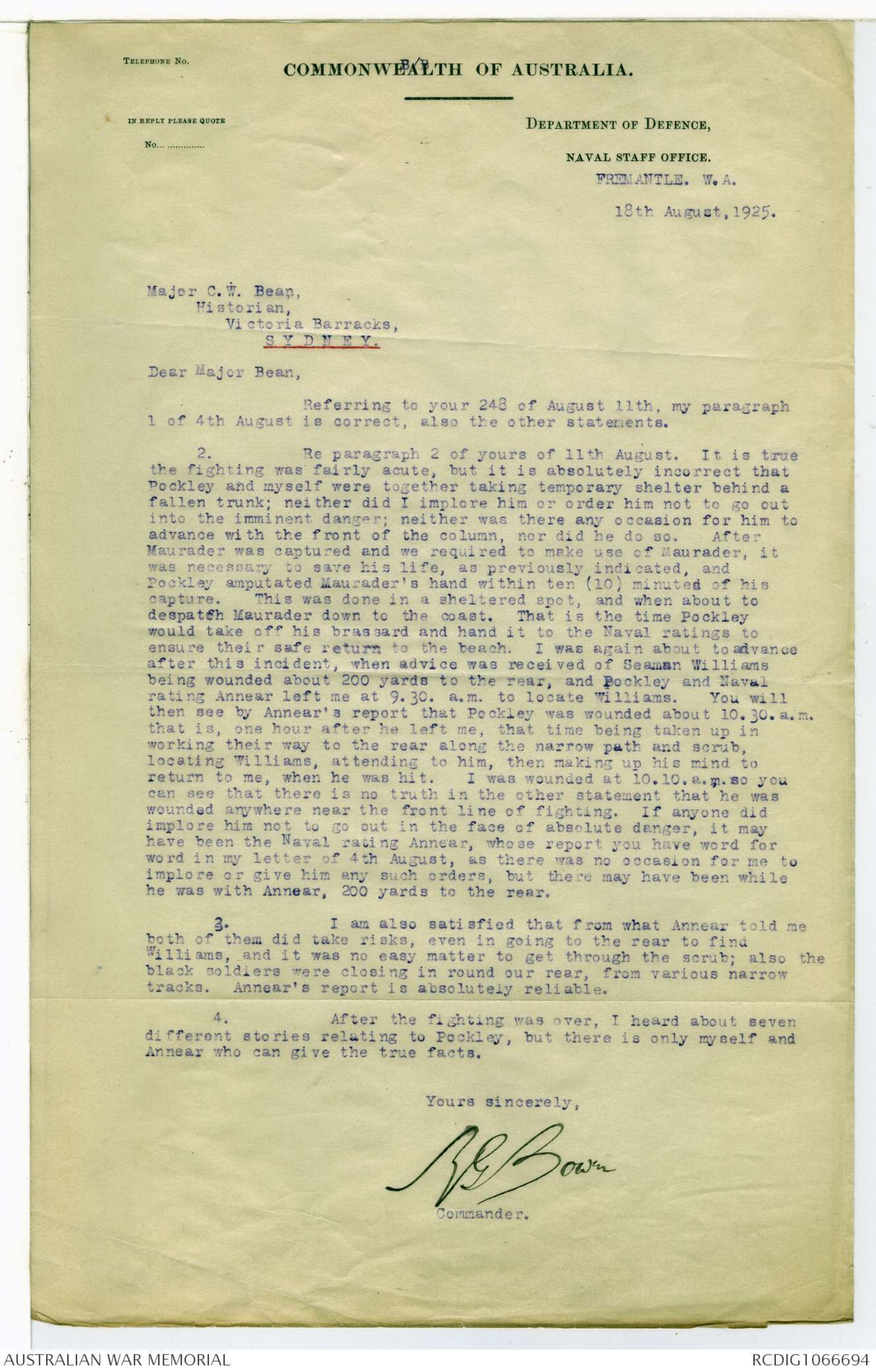
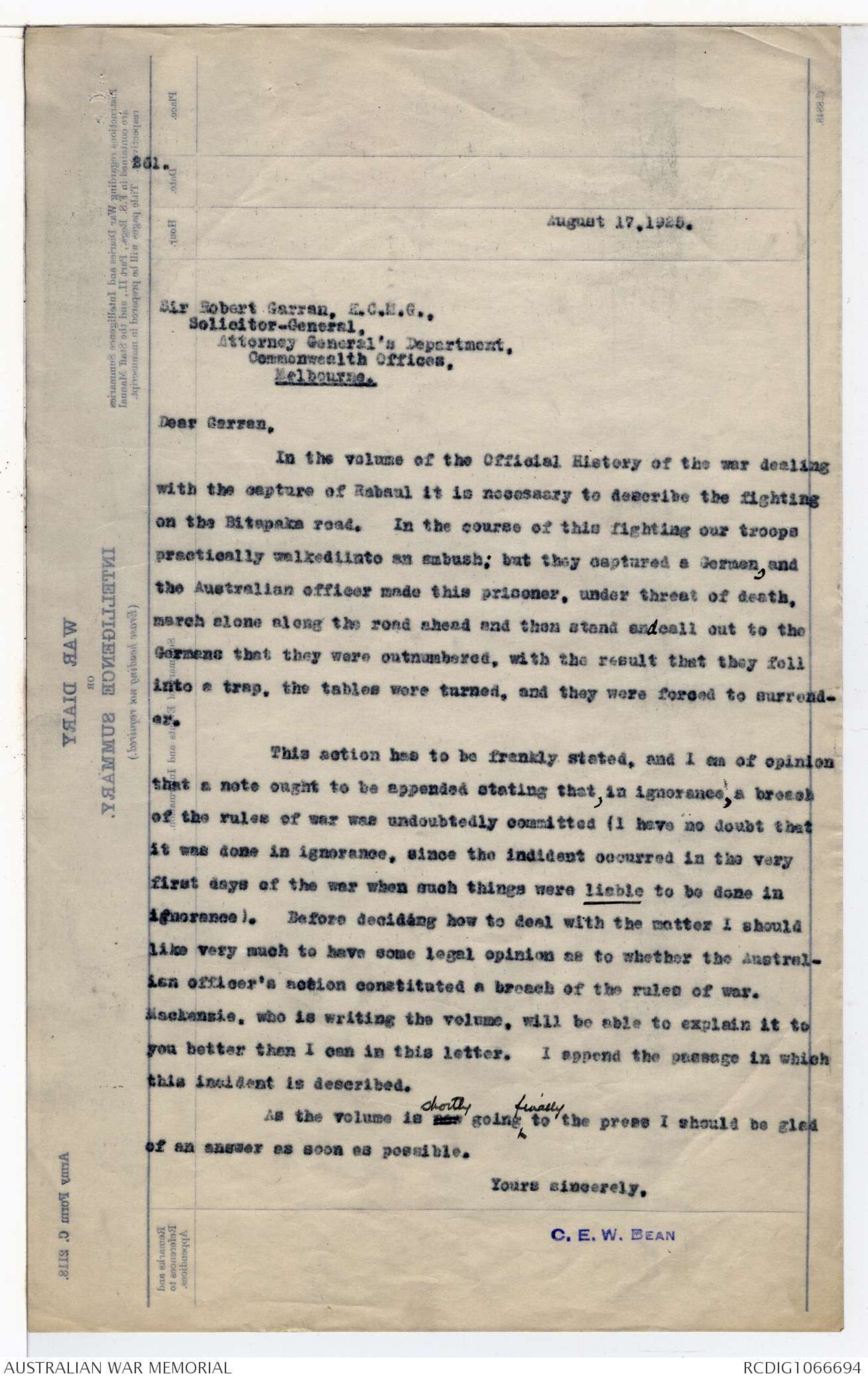
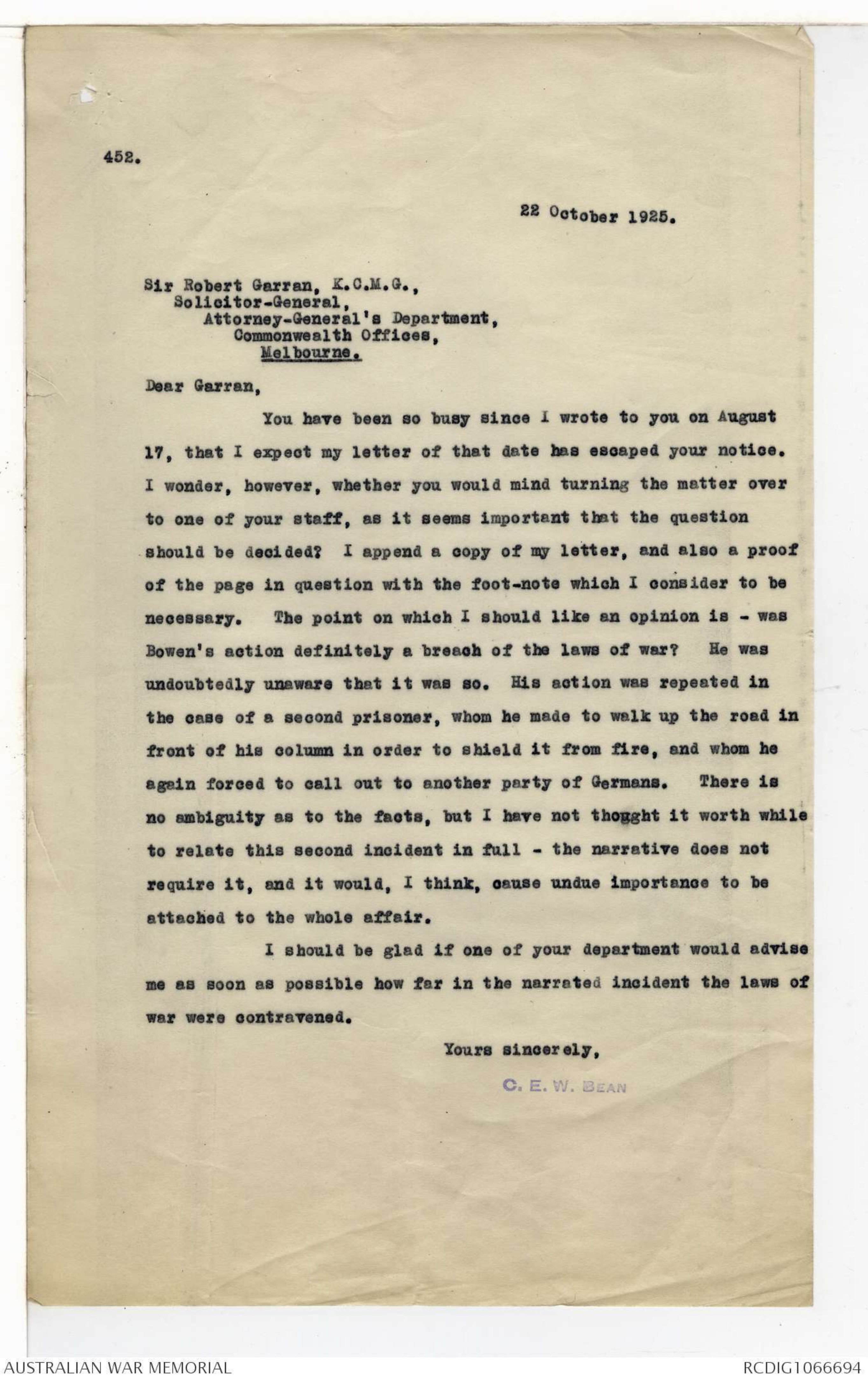
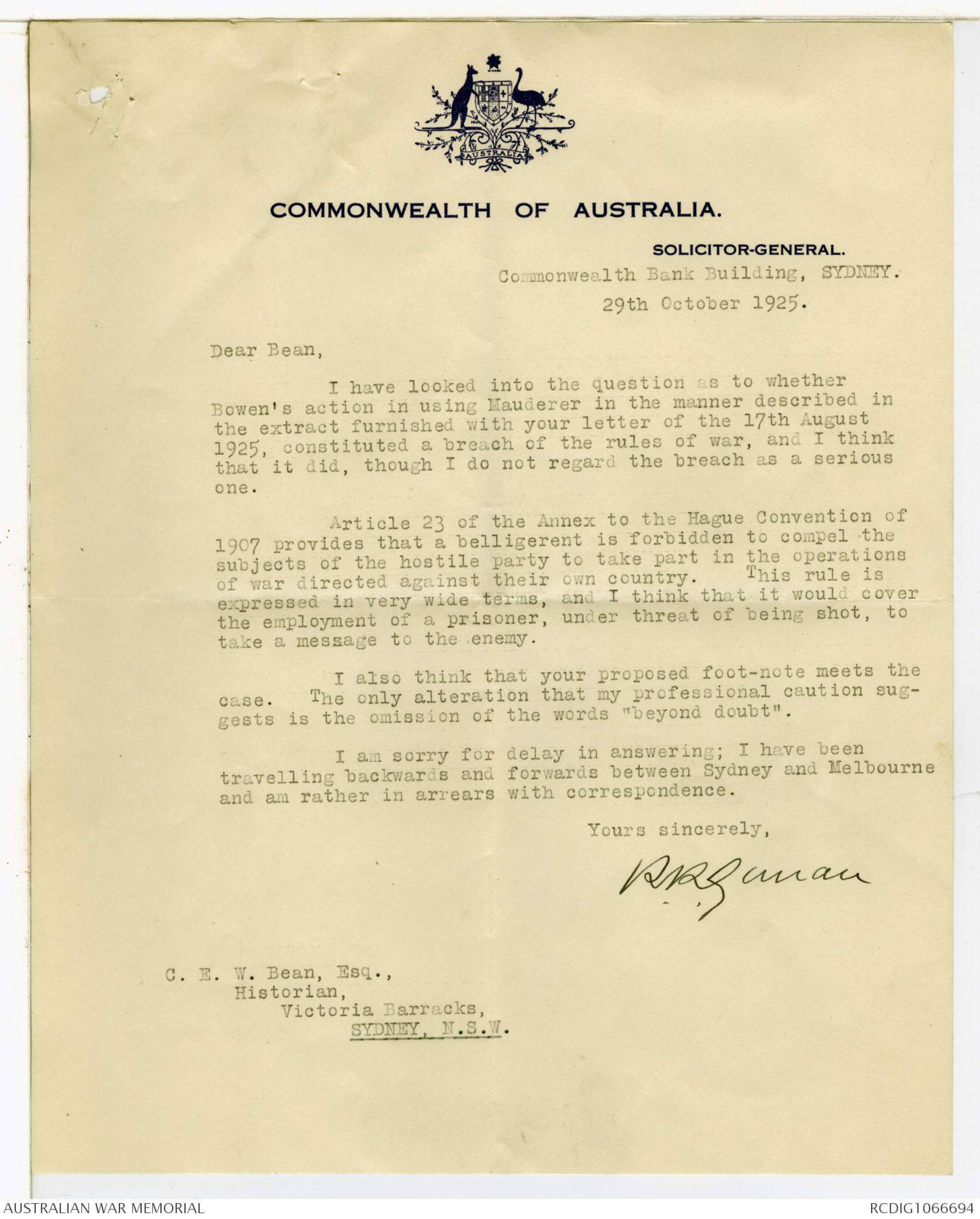
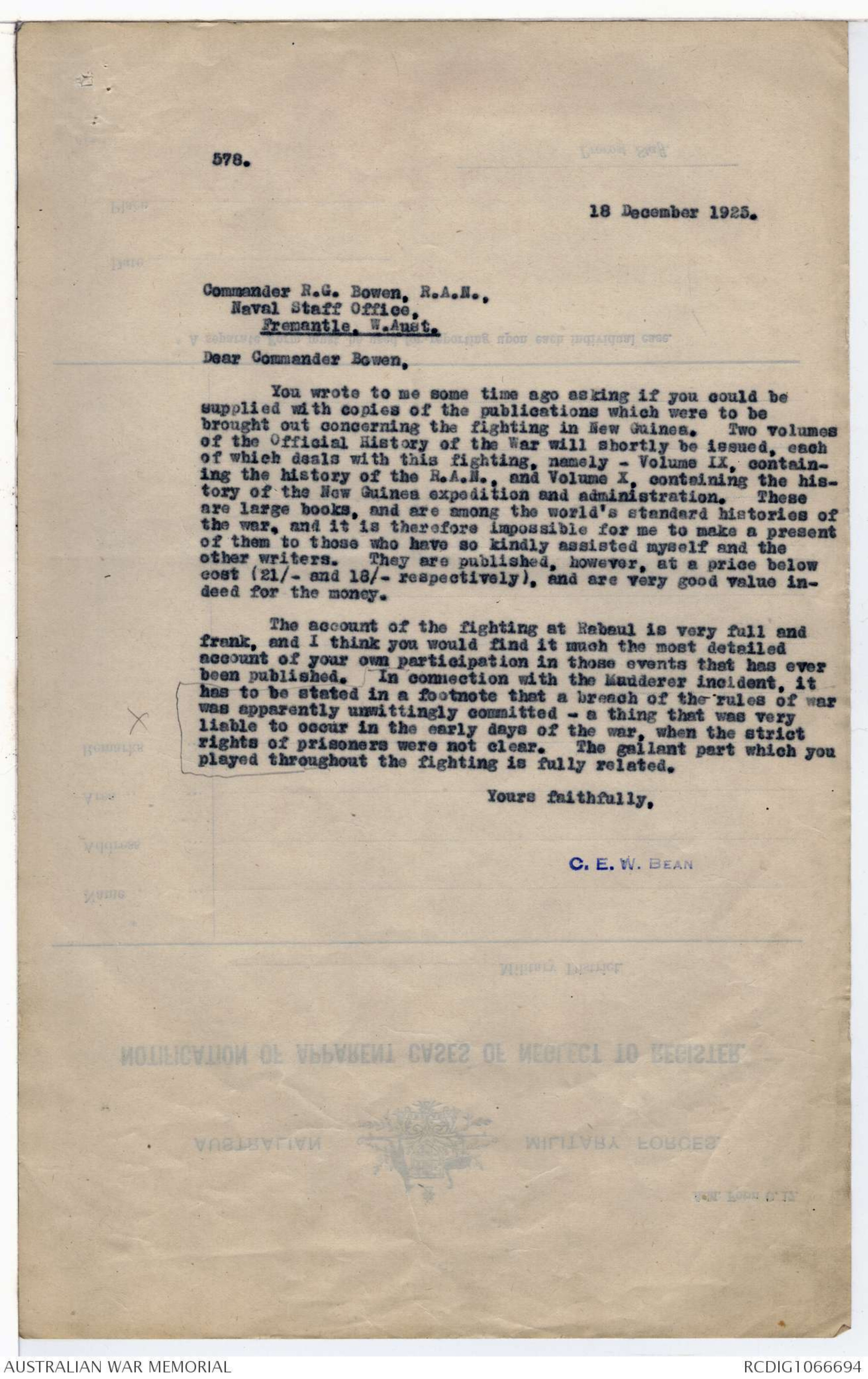
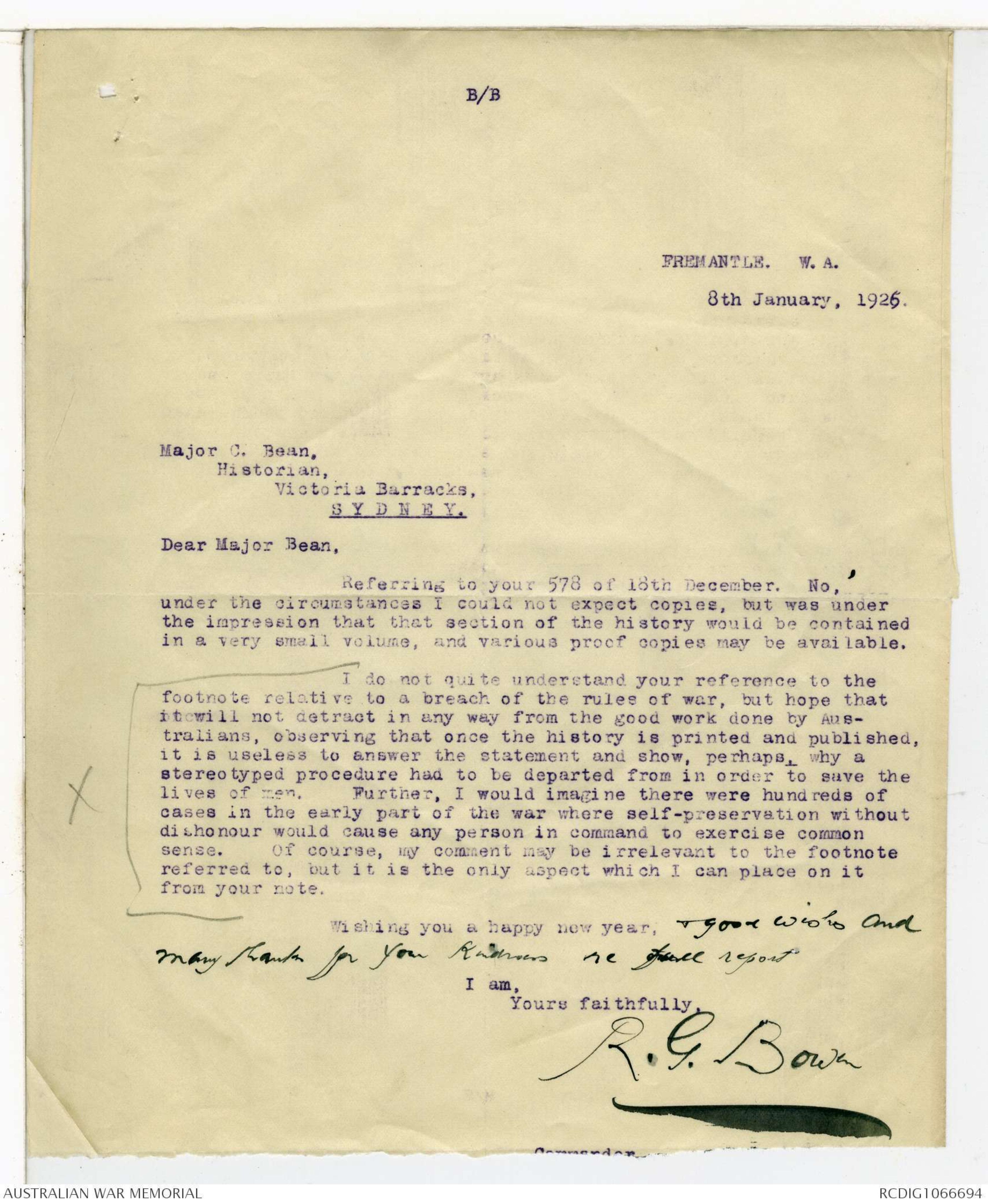
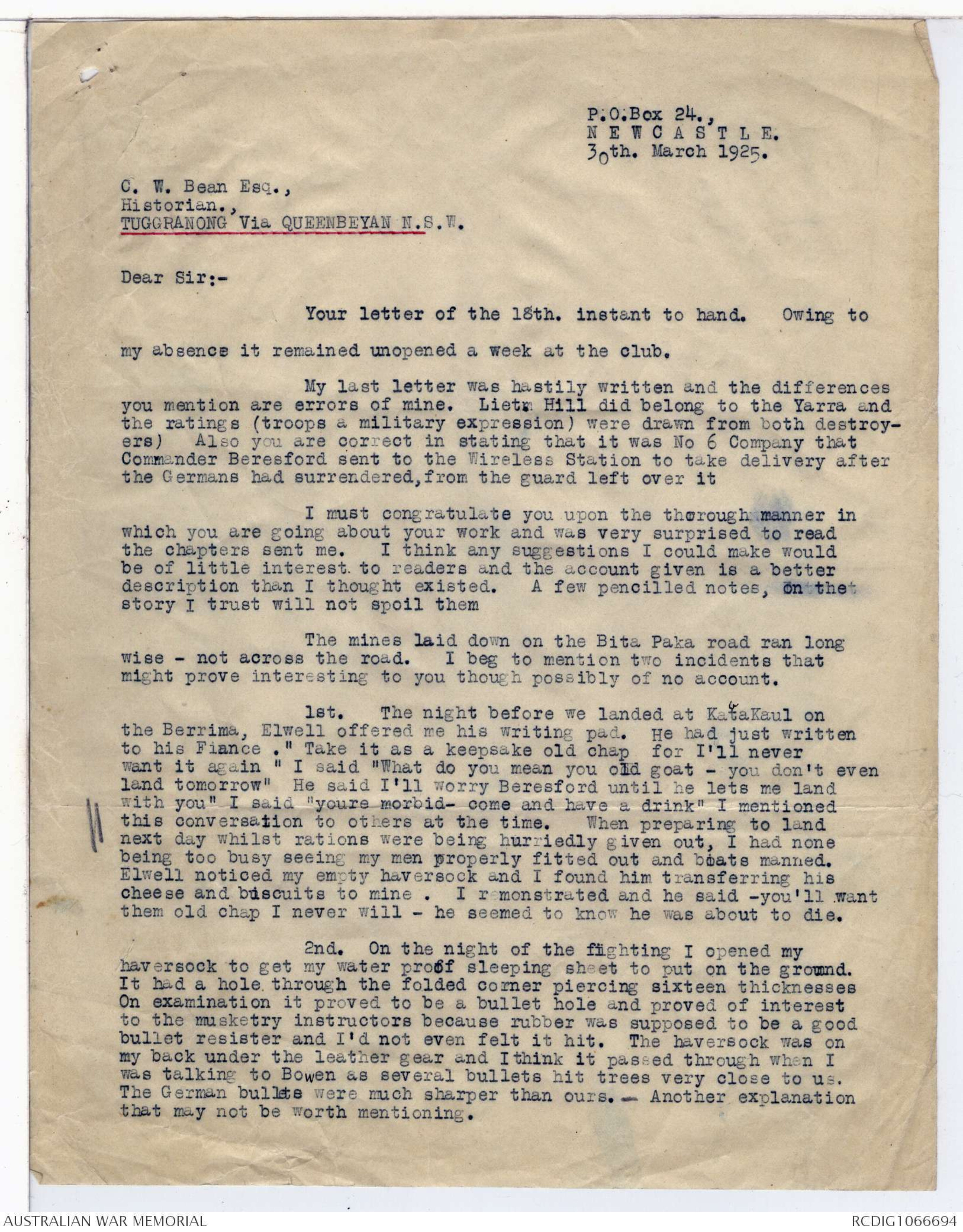
TELEPHONE No. B/B
COMMONWEALTH OF AUSTRALIA.
From Lt Commdr
Bowen
IN REPLY PLEASE QUOTE
No...............
DEPARTMENT OF DEFENCE,
NAVAL STAFF OFFICE.
FREMANTLE. W.A.
4th August, 1925.
Major C.E.W. Bean, A.I.F.,
Commonwealth Historian,
Victoria Barracks,
SYDNEY.
Dear Major Bean,
Your 220 of 28th July received.
1. The following is an extract from my report written at
the time.-
"Before being wounded, I remember despatching Surgeon Pockley
to attend to one of the connecting files who had been
wounded, and sent with him one armed seaman to prevent
attack from the natives, who, I understood, took no notice
of Red Cross arrangements, and apart from this, Surgeon
Pockley was not then wearing his Red Cross Brassard, which
I understood, he gave to one of the Stretcher Bearers or a
rating with Maurader. The report reached me that he had
been shot at 10.30.a.m., after attending to the wounded
man".
2. Now, I also have a copy of the report from A. Annear,
to whom I referred to above as an armed seaman, which was the way he was
dressed and armed, but, in reality, he was an Officers Steward of No. 4
Company (mine) and just after Pockley died, I asked him for some particulars.
Here is a copy:-
"Doctor Pockley and I left Lieutenant Bowen and Company at
9.30a.m. and we retraced our steps about 200 yards and
came to the spot at which Williams was lying wounded, on
the left side of the road, in a small gap. There were
two men standing by him.
Doctor Pockley did all that he could for Williams at the
time. We had just finished when a guard arrived from the
front with two Germans (prisoners). They wanted to take
the wounded man, Williams, down to the coast with them,
but the Doctor refused, and sent the two men that stood
by him down instead. We started to return to the front,
and had gone about 50 yards when a volley was fired at us
from a point in the road in front. We took cover, at the
side of the road, staying there for about 20 minutes, when
Doctor Pockley said that we had better return. On second
thoughts he said I had better remain where I was, and got
up to have a look around. He had proceeded about 10 yards
along the road when a volley was fired at him from the
same direction as before, and he was hit badly. I remained
where I was for a while, and about 10 Germans worked their
way to the back of me. About 10 minutes afterwards I heard
a cart coming along the road, which I hailed, The cart contained
3 sailors proceeding to the firing line as an Ambulance.
We picked up the Doctor and started for the coast.
When we arrived near the cross-roads we met the Stretcher-Bearers,
and we put the Doctor in the stretcher and hurried
towards the coast. The Doctor was wounded about 10.30a.m.
3. As contained in the first paragraph, Pockley was not wearing
his Red Cross badge when he proceeded to the rear to attend to the
-2 -
seaman in question (Williams), who was one of the connecting
files between my advance party and the coast, where the Destroyer
was, i.e., to my rear, and I am satisfied he took it (Brassard)
off his arm before he went to attend to the wounded seaman, and
gave it to either one of the Stretcher-Bearers or a seaman accompanying
Sergeant-Major Maurader back as a red cross case,
as much as a prisoner.
The point was that I recognised I was ambushed, but did
not admit this to Sergeant-Major Maurader, but used him as a decoy
and thus caused the collapse of the front line of Germans. That
is why Pockley and myself took so much trouble for a wounded German,
and to fulfil our promise for what he had done, we assured his
safe return to the beach. The following is an extract relating
thereto:-
"I found the thick scrub had cut off four of my
men on the right flank, so the order was given to close
to the left, and in doing so, we came across the enemy,
who immediately opened fire on us. This we replied to,
and at the same time, we continued to advance in a
crawling manner in order to get more protection from
the dense undergrowth. The firing continued about 10
minutes, and Petty Officer Palmer wounded Sergeant-Major
Maurader. This man I threatened to shoor at
once if he did not sing out to his comrades to surrender,
pointing out to him that 800 men were close on my heels,
which, of course, was untrue, at the same time stationing
Able Seamen on either side of the road to prevent
further surprise. Surgeon Pockley intimated to me that
the German would soon die from loss of blood if not attended
to, and I intimated to the German that his case was hopeless
in any way, but that I would shoot him if he did not
accede to my request to call out. He was then placed in
the middle of the road, where the enemy could see him,
while we covered him from the scrub, and as he sang out,
two German Officers, Captain Wuchert, and Lieutenant
Mayer, accompanied by a native guide, all being fully
armed, ran on to the road where Maurader was stationed.
The latter two tried to escape when they found they had
been trapped. These officers stated to me afterwards
that they did not understand the call, and having no
idea we had advanced so rapidly up the road, came out to
see what had happened, when they found themselves covered
with rifles from both sides of the road". I am afraid that had
we not tricked them therewould have been a said tale to tell.
It therefore appears quite clear to me that Surgeon wished
to protect those with Maurader at the expense of his own Red Cross
Badge, which probably had not come under my notice at the moment, and
its absence from his arm would not be noticed by me, or the necessity
for having one, by Surgeon Pockley; when he received my instructions
to proceed to the rear to attend to Williams, and as Annear points
out, he was shot when he left cover. But at the same time, I was
satisfied from the day of the operations that the natives, who appeared
very thick everywhere would shoot anyone on the attacking side,
so that probably the absence of the brassard did not matter much.
The removal of the said brassard took place in the rear and not to
the front, as stated in your letter.
Yours faithfully,
R. G. Bowen
Commander, R.A.N.
DISTRICT NAVAL OFFICER.W.A.
248.
August 11, 1925.
Commander R.G. Bowen, R.A.N.,
Naval Office,
Fremantle, W.A.
Dear Commander Bowen,
Many thanks for your letter. It deals satisfactorily
with all the points at issue with the possible
exception of this - that it has left me with an impression that
you think there may have been some doubt as to the incident of
Pockley giving up his red cross brassard, or as to the motive
of it. If that is so I should be very glad if you would tell
me quite frankly what is your own opinion because, fine story
though it is, it is very important that we should not give the
stamp of official truth if there is any doubt about it. I may
be entirely wrong in drawing this impression from your letter,
but I should greatly value your frank opinion on the point. Is
it, for example, certain that Pockley ever had his brassard?
I understand from another account that when
Pockley left you the fighting was fairly acute, and that you and
he were together taking temporary shelter behind a fallen trunk
in the course of the advance, and also that you implored and
even ordered him not to go out into the imminent danger. From
your account I have the impression that what really occurred was
that you had previously told him that his place was at the rear,
and that he should not advance with the front of the column, and
that this is really the order referred to in the other account.
Would you kindly let me know whether such was the case, and
whether at the time when he went to find Williams it was possible
without great risk to walk through the scrub erect, or whether he
and Seaman Annear had to creep to the rear clinging to shelter?
I shall probably send these chapters to the
printer and make any necessary additions later; but I shall be
obliged if you would reply, if possible, by return in case the
manuscript is still here.
Yours faithfully,
C. E. W. BEAN
TELEPHONE NO.
B/B
COMMONWEALTH OF AUSTRALIA.
IN REPLY PLEASE QUOTE
NO....
DEPARTMENT OF DEFENCE,
NAVAL STAFF OFFICE.
FREMANTLE. W.A.
18th August, 1925.
Major C.W. Bean,
Historian,
Victoria Barracks,
SYDNEY.
Dear Major Bean,
Referring to your 248 of August 11th, my paragraph
1 of 4th August is correct, also the other statements.
2. Re paragraph 2 of yours of 11th August. It is true
the fighting was fairly acute, but it is absolutely incorrect that
Pockley and myself were together taking temporary shelter behind a
fallen trunk; neither did I implore him or order him not to go out
into the imminent danger; neither was there any occasion for him to
advance with the front of the column, nor did he do so. After
Maurader was captured and we required to make use of Maurader, it
was necessary to save his life, as previously indicated, and
Pockley amputated Maurader's hand within ten (10) minutes of his
capture. This was done in a sheltered spot, and when about to
despatch Maurader down to the coast. That is the time Pockley
would take off his brassard and hand it to the Naval ratings to
ensure their safe return to the beach. I was again about to advance
after this incident, when advice was received of Seaman Williams
being wounded about 200 yards to the rear, and Pockley and Naval
rating Annear left me at 9.30. a.m. to locate Williams. You will
then see by Annear's report that Pockley was wounded about 10.30.a.m.
that is, one hour after he left me, that time being taken up in
working their way to the rear along the narrow path and scrub,
locating Williams, attending to him, then making up his mind to
return to me, when he was hit. I was wounded at 10.10.a.m. so you
can see that there is no truth in the other statement that he was
wounded anywhere near the front line of fighting. If anyone did
implore him not to go out in the face of absolute danger, it may
have been the Naval rating Annear, whose report you have word for
word in my letter of 4th August, as there was no occasion for me to
implore or give him any such orders, but there may have been while
he was with Annear, 200 yards to the rear.
3. I am also satisfied that from what Annear told me
both of them did take risks, even in going to the rear to find
Williams, and it was no easy matter to get through the scrub; also the
black soldiers were closing in round our rear, from various narrow
tracks. Annear's report is absolutely reliable.
4. After the fighting was over, I heard about seven
different stories relating to Pockley, but there is only myself and
Annear who can give the true facts.
Yours sincerely,
R G Bowen
Commander.
261.
August 17, 1925.
Sir Robert Garran, K.C.M.G.,
Solicitor-General,
Attorney General's Department,
Commonwealth Offices,
Melbourne.
Dear Garran,
In the volume of the Official History of the war dealing
with the capture of Rabaul it is necessary to describe the fighting
on the Bitapaka road. In the course of this fighting our troops
practically walkediinto an ambush; but they captured a German, and
the Australian officer made this prisoner, under threat of death,
march alone along the road ahead and then stand and call out to the
Germans that they were outnumbered, with the result that they fell
into a trap, the tables were turned, and they were forced to surrender.
This action has to be frankly stated, and I am of opinion
that a note ought to be appended stating that, in ignorance, a breach
of the rules of war was undoubtedly committed (I have no doubt that
it was done in ignorance, since the incident occurred in the very
first days of the war when such things were liable to be done in
ignorance). Before deciding how to deal with the matter I should
like very much to have some legal opinion as to whether the Australian
officer's action constituted a breach of the rules of war.
Mackenzie, who is writing the volume, will be able to explain it to
you better than I can in this letter. I append the passage in which
this incident is described.
As the volume is now shortly going ^finally to the press I should be glad
of an answer as soon as possible.
Yours sincerely,
C.E.W. BEAN
452.
22 October 1925.
Sir Robert Garran, K.C.M.G.,
Solicitor-General,
Attorney-General's Department,
Commonwealth Offices,
Melbourne.
Dear Garran,
You have been so busy since I wrote to you on August
17, that I expect my letter of that date has escaped your notice.
I wonder, however, whether you would mind turning the matter over
to one of your staff, as it seems important that the question
should be decided? I append a copy of my letter, and also a proof
of the page in question with the foot-note which I consider to be
necessary. The point on which I should like an opinion is - was
Bowen's action definitely a breach of the laws of war? He was
undoubtedly unaware that it was so. His action was repeated in
the case of a second prisoner, whom he made to walk up the road in
front of his column in order to shield it from fire, and whom he
again forced to call out to another party of Germans. There is
no ambiguity as to the facts, but I have not thought it worth while
to relate this second incident in full - the narrative does not
require it, and it would, I think, cause undue importance to be
attached to the whole affair.
I should be glad if one of your department would advise
me as soon as possible how far in the narrated incident the laws of
war were contravened.
Yours sincerely,
C. E. W. BEAN
COMMONWEALTH OF AUSTRALIA.
SOLICITOR-GENERAL.
Commonwealth Bank Building, SYDNEY.
29th October 1925.
Dear Bean,
I have looked into the question as to whether
Bowen's action in using Mauderer in the manner described in
the extract furnished with your letter of the 17th August
1925, constituted a breach of the rules of war, and I think
that it did, though I do not regard the breach as a serious
one.
Article 23 of the Annex to the Hague Convention of
1907 provides that a belligerent is forbidden to compel the
subjects of the hostile party to take part in the operations
of war directed against their own country. This rule is
expressed in very wide terms, and I think that it would cover
the employment of a prisoner, under threat of being shot, to
take a message to the enemy.
I also think that your proposed foot-note meets the
case. The only alteration that my professional caution suggests
is the omission of the words "beyond doubt".
I am sorry for delay in answering; I have been
travelling backwards and forwards between Sydney and Melbourne
and am rather in arrears with correspondence.
Yours sincerely,
RR Garran
C. E. W. Bean, Esq.,
Historian,
Victoria Barracks,
SYDNEY, N.S.W.
578.
18 December 1925.
Commander R.G. Bowen, R.A.N.,
Naval Staff Office,
Fremantle, W.Aust.
Dear Commander Bowen,
You wrote to me some time ago asking if you could be
supplied with copies of the publications which were to be
brought out concerning the fighting in New Guinea. Two volumes
of the Official History of the War will shortly be issued, each
of which deals with this fighting, namely - Volume IX, containing
the history of the R.A.N., and Volume X, containing the history
of the New Guinea expedition and administration. These
are large books, and are among the world's standard histories of
the war, and it is therefore impossible for me to make a present
of them to those who have so kindly assisted myself and the
other writers. They are published, however, at a price below
cost (21/- and 18/- respectively), and are very good value indeed
for the money.
The account of the fighting at Rabaul is very full and
frank, and I think you would find it much the most detailed
account of your own participation in those events that has ever
been published. In connection with the Mauderer incident, it
has to be stated in a footnote that a breach of the rules of war
[*X*] was apparently unwittingly committed - a thing that was very
liable to occur in the early days of the war, when the strict
rights of prisoners were not clear. The gallant part which you
played throughout the fighting is fully related.
Yours faithfully,
C. E. W. BEAN
B/B
FREMANTLE. W.A.
8th January, 1926.
Major C. Bean,
Historian,
Victoria Barracks,
SYDNEY.
Dear Major Bean,
Referring to your 578 of 18th December. No,
under the circumstances I could not expect copies, but was under
the impression that that section of the history would be contained
in a very small volume, and various proof copies may be available.
I do not quite understand your reference to the
footnote relative to a breach of the rules of war, but hope that
it will not detract in any way from the good work done by Australians,
observing that once the history is printed and published,
it is useless to answer the statement and show, perhaps, why a
stereotyped procedure had to be departed from in order to save the
[*X *] lives of men. Further, I would imagine there were hundreds of
cases in the early part of the war where self-preservation without
dishonour would cause any person in command to exercise common
sense. Of course, my comment may be irrelevant to the footnote
referred to, but it is the only aspect which I can place on it
from your note.
Wishing you a happy new year & good wishes and
many thanks for your kindness re full report
I am,
Yours faithfully,
R.G. Bowen
Commander
P.O. Box 24.,
NEWCASTLE.
30th. March 1925.
C. W. Bean Esq.,
Historian.,
TUGGRANONG Via QUEENBEYAN N.S.W.
Dear Sir:-
Your letter of the 18th. instant to hand. Owing to
my absence it remained unopened a week at the club.
My last letter was hastily written and the differences
you mention are errors of mine. Liet. Hill did belong to the Yarra and
the ratings (troops a military expression) were drawn from both destroyers)
Also you are correct in stating that it was No 6 Company that
Commander Beresford sent to the Wireless Station to take delivery after
the Germans had surrendered, from the guard left over it
I must congratulate you upon the thorough manner in
which you are going about your work and was very surprised to read
the chapters sent me. I think any suggestions I could make would
be of little interest to readers and the account given is a better
description than I thought existed. A few pencilled notes, on the
story I trust will not spoil them
The mines laid down on the Bita Paka road ran long
wise - not across the road. I beg to mention two incidents that
might prove interesting to you though possibly of no account.
1st. The night before we landed at KatbaKaul on
the Berrima, Elwell offered me his writing pad. He had just written
to his Fiance." Take it as a keepsake old chap for I'll never
want it again " I said "What do you mean you old goat - you don't even
land tomorrow" He said I'll worry Beresford until he lets me land
with you" I said "youre morbid- come and have a drink" I mentioned
this conversation to others at the time. When preparing to land
next day whilst rations were being hurriedly given out, I had none
being too busy seeing my men properly fitted out and boats manned.
Elwell noticed my empty haversock and I found him transferring his
cheese and biscuits to mine. I remonstrated and he said -you'll want
them old chap I never will - he seemed to know he was about to die.
2nd. On the night of the fighting I opened my
haversock to get my water proof sleeping sheet to put on the ground.
It had a hole through the folded corner piercing sixteen thicknesses
On examination it proved to be a bullet hole and proved of interest
to the musketry instructors because rubber was supposed to be a good
bullet resister and I'd not even felt it hit. The haversock was on
my back under the leather gear and I think it passed through when I
was talking to Bowen as several bullets hit trees very close to us.
The German bullets were much sharper than ours.- Another explanation
that may not be worth mentioning.
 Sam scott
Sam scottThis transcription item is now locked to you for editing. To release the lock either Save your changes or Cancel.
This lock will be automatically released after 60 minutes of inactivity.